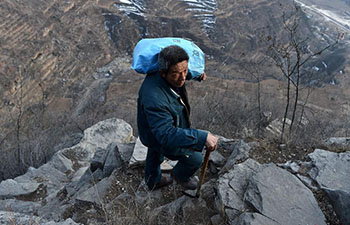
An official of Doctors Without Borders (DWB) gives a sugar solution to a patient at a cholera command center at Chinengundu Clinic in Chegutu town, 100 km west of Harare, capital of Zimbabwe, on Jan. 22, 2018. Zimbabwe is on high alert following a cholera outbreak in Chegutu town that has killed four people and 32 other cases reported, Health and Child Care Minister David Parirenyatwa said on Monday. (Xinhua/Shaun Jusa)
HARARE, Jan. 22 (Xinhua) -- Zimbabwe is on high alert following a cholera outbreak in Chegutu town, 100 km west of the capital Harare, that has killed four people and 32 other cases reported, Health and Child Care Minister David Parirenyatwa said on Monday.
The outbreak comes at a time when neighboring Zambia is battling a cholera outbreak that has claimed more than 67 lives.
Parirenyatwa said of the 32 cases, two had been confirmed while 30 were suspected in the outbreak reported last Friday.
"We think the index case was an 80-year-old female who succumbed to the disease at home on the 8th of January, 2017," the minister told a press conference.
The minister said some of the people who washed the body of the Muslim woman in preparation for burial are among those who subsequently died while all the suspected cases are all linked to funerals that occurred in the area.
The minister dismissed reports that one more person, a child, had died from cholera, indicating that the death toll still remained at four.
The minister said investigations were still continuing to establish whether the outbreak in Chegutu was linked to the Zambian cholera outbreak.
Chegutu, like many urban centers in Zimbabwe, suffers from poor water and sanitation conditions, uncollected refuse and uncontrolled vending of foodstuffs which pose the danger of diarrhoeal diseases.
"There is rampant vending in undesignated places, including selling of meat and fruits in pavements. People buy and eat all these on the streets in unhygienic conditions, putting themselves at risk of cholera and diarrheal disease," the minister said.
He urged people in the country to practice good hygiene, avoid big gatherings and shaking of hands at funerals during outbreaks.
Water-borne diseases have become endemic in Zimbabwe's cities in recent years due to deteriorating water and sanitation conditions.
In 2008, the country recorded its worst cholera outbreak in history when more than 4,000 people died from the disease.















